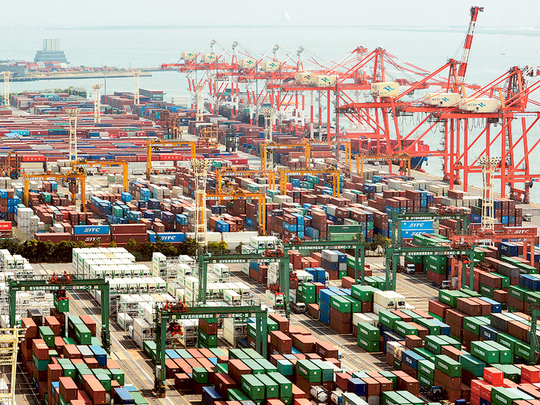
Washington: Japanese Prime Minister Shinzo Abe’s visit to Washington next week comes amid heightened attention in Congress to an Asia-Pacific trade deal that has created a deep rift between President Barack Obama and members of his Democratic Party and whose central feature is liberalised commerce between the US and Japan.
White House officials said Friday that Obama and Abe are not expected to announce a final agreement on trade talks between the two nations. Officials said negotiators have made progress, but differences remain over how to reduce US auto tariffs and Japanese barriers on US agriculture products.
Abe’s official visit to Washington on Tuesday will include a state dinner with about 300 guests and an address to a joint meeting of Congress, the first by a Japanese leader. New security arrangements between the US and Japan are a top agenda item for the two leaders as Abe seeks to strengthen Japan’s defence capabilities.
Given that it’s the 70th anniversary of the end of the Second World War, Abe is also facing some pressure to address Japanese army behaviour against Korea and China during the war. The White House is especially eager for Abe to mend fences with South Korea. And this week, 25 US lawmakers urged Abe “to formally reaffirm and validate” apologies made by his predecessors for Japanese wartime aggression.
Yet even without prospects for a breakthrough on trade, the negotiations between the US and Japan are likely to take precedence as Congress moves to give Obama so-called fast-track authority to negotiate international trade deals. House and Senate committees both approved legislation that would set standards for any trade deal but would permit Congress only to approve or reject, but not amend, any final agreement.
Obama wants such authority to complete a 12-nation Pacific Rim agreement. The US and Japan are the two largest economies in those negotiations, which means that resolving their differences would go far in approaching a broader deal.
Caroline Atkinson, White House deputy national security adviser for international economics, said on Friday negotiators had made substantial progress, but “we do not expect any announcement of a final deal. We still have some work to do.”
Abe arrives in the US just as Obama is engaged in a fierce fight with liberals and organised labour, who oppose giving him trade promotion authority and who are suspicious about trade deals because they fear job losses. A coalition of Democrats and Republicans have also tried, so far unsuccessfully, to require that any trade deal address currency manipulation, amid concern that Japan has adjusted the yen to give an advantage to its exports. The Obama administration has opposed inserting such restrictions in trade deals.
Fast-track authority
Democrats such as Sens. Elizabeth Warren of Massachusetts and Sherrod Brown of Ohio have been among the most vocal critics. And Senate Democratic Leader Harry Reid said that when it came to granting Obama fast-track authority to cut the deal, “I’m not only no, I’m hell no”
Obama on Thursday and Friday went on offence against the critics, declaring complaints about secrecy are “dishonest.” On Thursday, conceding many of his own allies have lined up against him, he said critics who say a trade deal with Pacific Rim countries is bad for working families “don’t know what they’re talking about.”
Obama noted that before Congress votes on the Asia-Pacific trade deal, lawmakers would have at least three months to “scrutinise every comma and period and number in the text.”
“So there’s nothing secret about it, and when I just keep on hearing people repeating this notion that it’s secret, I gotta say, it’s dishonest,” he said in a conference call with a group of reporters. “And it’s a little concerning when I see friends of mine resorting to those tactics.”
Still, aspects of the trade talks remain out of public view while negotiations continue, and the push back from the president did not sit well with trade deal opponents.
“American workers who have lost their jobs due to trade deals are understandably sceptical,” said Eric Hauser, the AFL-CIO’s communications director. “The best way to regain workers’ confidence is to release the text, not scold the critics.”












